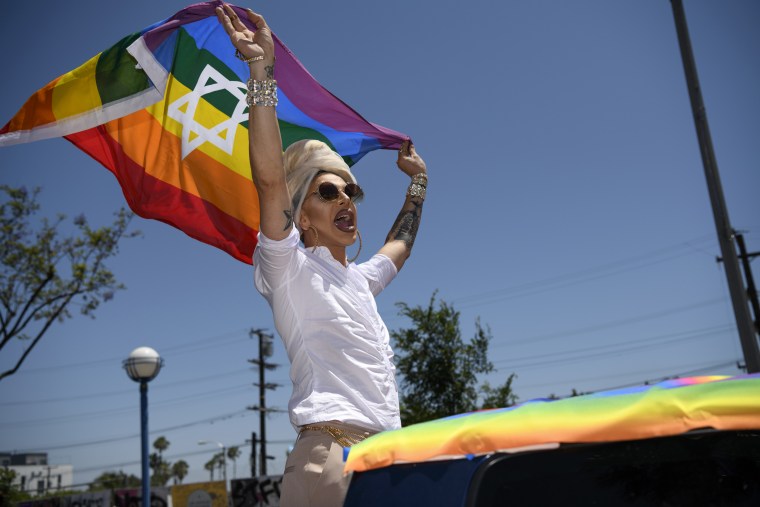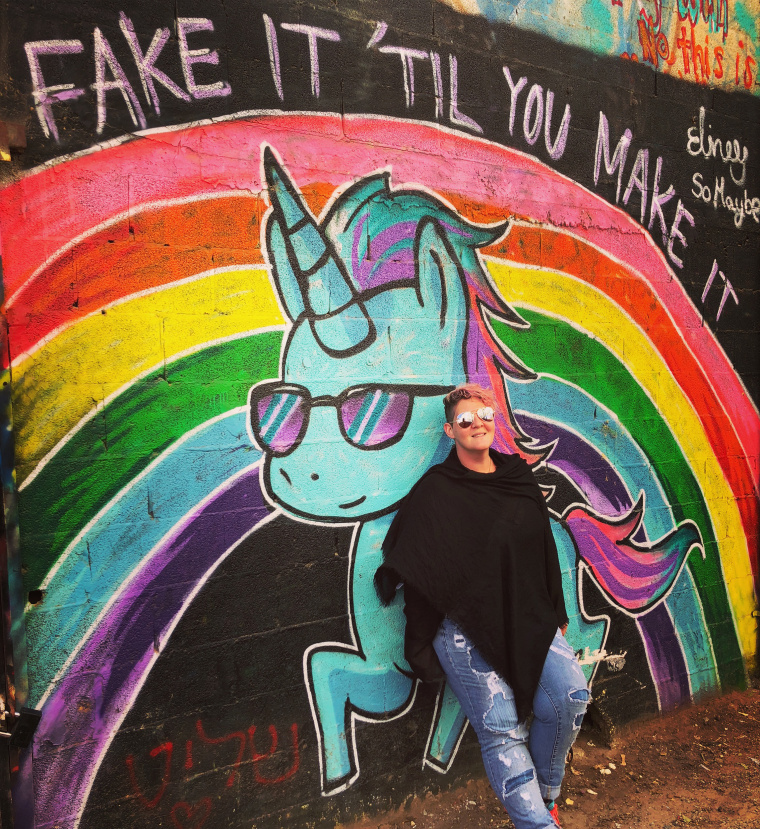Israeli-Palestinian Conflict Tears into LGBTQ Jewish Community
The Israeli-Palestinian conflict — ostensibly not about LGBTQ issues and thousands of miles from the U.S. — has become a potent flashpoint within the queer community.
For years, the debate over Israel’s treatment of the Palestinians has roiled LGBTQ gatherings and parades where Jewish groups wanted to display symbols of the religion. In 2017, organizers of the Chicago Dyke March kicked women out for carrying the Pride flag with a Star of David, citing its resemblance to the Israeli flag.
This month, a soon-to-open gay bar in Minneapolis became embroiled in the dispute when a journalist unearthed tweets by the bar’s owner calling for the death of all Israelis. The owner also accused Zionist Jews, broadly defined as those who support a Jewish state in Israel in some form, as running America. The tweets were both anti-Semitic and anti-Zionist, but in many other recent controversies, parsing those two ideologies can be divisive.
As it is, many Americans living at the intersection of Jewish and queer identities have been alarmed by news reports that affect the two groups: synagogue shootings, rollbacks in federal rights for LGBTQ people, swastikas painted on Jewish institutions, Israeli and Pride flags being burned and urinated on and rising hate crimes against Jews and queer people. Activists say that shared sense of alarm should prevent political disagreements over Israel from boiling over into anti-Semitism.
A.J. CAMPBELL
“It’s important that we all call out anti-Semitism in our own spaces,” said Amanda Berman, founder of the “unabashedly progressive” and “unquestionably Zionist” group Zioness. “It’s hard work to call it out in your own movement.”
CONFRONTATION OVER SYMBOLS
At this year’s Creating Change conference in Detroit, a national event that focuses on LGBTQ issues, pro-Palestinian protestors disruptedthe opening ceremony to condemn the lack of Palestinian programming. At the 2016 conference, in Chicago, the pro-Israel LGBTQ organization A Wider Bridge shut down its event and evacuated guests because of intense protests.

Whether that flag that has produced so many protests is Jewish, Israeli or both is complicated. The Star of David has been a Jewish symbol for hundreds and possibly thousands of years, long before the founding of the state of Israel in 1948. The Pride flag with the Jewish star in the middle of a rainbow background is the most common symbol of Jewish LGBTQ Pride, but it is not the official Israeli Pride flag, which replaces the two blue banners at the top and bottom of the Israeli flag with rainbow colors.
Rae Gaines, 30, is an organizer of the Dyke March in Washington that took place June 7. Gaines, who is Jewish but anti-Zionist, said it was unfortunate that Jewish women were kicked out of the Chicago march and wanted the situation handled better in Washington. Organizers there decided to ask attendees not to bring “nationalist symbols” of any country, but allowed Palestinian flags because they “don’t yet have a nation.”
“It can be scary to be a Jew. I can relate to the fear of existing,” Gaines said. “I wanted to relate to that, but without being nationalist.”
Gaines said march organizers had alternate Jewish Pride flags on hand and intended to ask anyone with a Star of David on their flag to swap them out in order to avoid making Palestinians feel unwelcome or unsafe. However, the nuanced approach Gaines hoped for turned into a bitter public confrontation.
Related
Integration or revolution? LGBTQ activists split over what Pride is all about
A.J. Campbell, 50, an activist, contacted the march to ask about bringing the rainbow flag with the Jewish star, with the events in Chicago in mind. She was angered when she was told it “would not be welcome.” She took the issue to the media, and it was widely reported and condemned as a ban. The National LGBT Taskforce and the Human Rights Campaign disaffiliated from the march, condemning the policy as anti-Semitic and not inclusive.
“There’s Pride flags with crosses and crescent moons in the center. The Jewish star is our symbol,” Campbell said. “I would never ask Palestinians to censor their symbols,” she continued, noting that some Jews might feel unsafe around a Palestinian flag because of terror attacks against Israelis.
A group of 30 people, including Campbell, showed up to the Dyke March in Washington with their flags and argued with organizers about whether the placement of the star at the flag’s center was equated with Zionism and if the star should be placed elsewhere on the flag.
The group ultimately joined the march, flag in tow. Gaines said there was never an intention to block the flag but rather a hope people would understand why it wasn’t welcome.
“The narrative became that we were a space that was anti-Semitic, which was painful,” Gaines said. “I’m a Jew who loves being Jewish, so it hurts.”
EXCLUDED OVER MIDEAST POLITICS
Some LGBTQ Jews embrace the Jewish Pride flag’s similarity to the Israeli flag, saying they want to celebrate their connection to Israel as part of their intersectional identity. However, some say if they openly identify as anything other than anti-Zionist, they are unwelcome in certain queer spaces.
Emily Cohen, 36, a queer woman who runs an advocacy group for transgender people and other underserved groups in South Florida, said she is constantly defending her beliefs in LGBTQ spaces.
“It’s tiring to have to explain my position over and over,” she said. “There’s a line in the sand, you’re on one side or the other, and it shouldn’t be that way.”

In 2012, Cohen ran an LGBTQ student center at a South Florida university. She said she kept her Judaism quiet, because the students were “vehemently anti-Israel.”
That experience inspired her to explore her connection to Israel, so she went on a mission there with A Wider Bridge.
She said she came back emboldened to defend her support for Israel existing as a Jewish state, clarifying that she would like to see an end to the conflict and a Palestinian state. But she said the situation is complicated and cannot be blamed on or fixed solely by Israel.
She explains to friends that the Israeli government does not represent all Israelis, just as President Donald Trump does not speak for all Americans. Still, she said some of her queer friends dismissed her trip as a brainwashing effort by Israel supporters.
She said that sometimes the comments are blatantly anti-Semitic.
“People talk as if Jews are racist and elitist for wanting their own country, that Jews like to steal land,” she said. “It’s super uncomfortable for me.”
Cohen points out that in Israel, most LGBTQ people live safely with many rights, even if far from full equality, while many queer people in Palestine cannot live openly. She asks why pro-Palestinian queer people don’t specifically condemn queer oppression in Palestine, noting a report of Hamas executing a gay man in Gaza by throwing him off a building.
Gaines, the Washington march organizer, said that discussion of condemning the reported Palestinian brutality against queer people did not come up in planning meetings for the march, which considered itself “fiercely” pro-Palestinian. “Perhaps that’s something we can talk about for next year,” Gaines said.
Related
Another Pride surprise: Biden visits Stonewall
Alyssa Rubin, 24, a queer activist with IfNotNow, a group that advocates ending the occupation of Palestinians, also declined to specifically condemn Palestinian oppression of queer people.
“Palestinians deal with multiple systems of oppression — from the occupation to the patriarchy and homophobia,” she said.
But, unlike many progressive activists, she also declined to dismiss Pride events in Israel, such as last week’s parade in Tel Aviv with over 250,000 participants, as “pinkwashing,” or an attempt to distract from the occupation of Palestinians.
“Queer Israelis have a right to celebrate being queer,” Rubin said. “Terrible things are happening in the U.S. right now, but we still celebrate Pride. The Dyke March has anti-colonialist politics, yet they’re in the U.S., colonial sins and all.”
Rubin said that while support for Israel can be a litmus test for Jews in queer spaces, it can also be a test for queers in Jewish spaces. She cited events in which Hillel, a Jewish organization across college campuses that supports Israel, banned queer Jewish groups that partner with anti-Zionist groups.
“Unquestionably supporting Israel should not be a requirement for Jews to support Jewish queers,” she said. “Hillel should support all queer Jews, regardless of Israel politics.”
All of the activists interviewed said their Jewish and queer identities are tightly bound and most said they have struggled to gain acceptance within the queer community, the Jewish community or both.
“We’ve made so much progress as queer Jews,” Campbell said. “I did not expect the next fight to be within the queer community.”